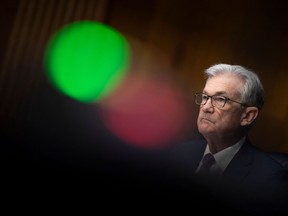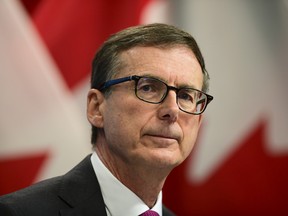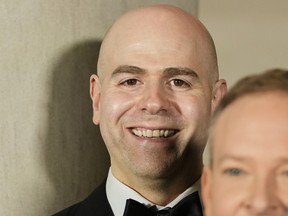Kevin Carmichael: Rosenberg isn’t alone in thinking that central banks will be making a mistake if they overreact now
Article content
Bay Street’s most famous bear is growling again.
Advertisement
This advertisement has not loaded yet, but your article continues below.
Article content
David Rosenberg, who was among the relatively small group of forecasters who gave investors a chance to head for the hills before the Great Recession arrived in 2008, thinks central bankers in the United States and Canada are about to make a terrible mistake.
“Sometime in the second half of this year, we’re not going to be talking about inflation, we’re going to be talking about a recession,” Rosenberg, the former Merrill Lynch chief economist for North America who now runs his own research firm in Toronto, told the Financial Post’s Larysa Harapyn in a video interview on Jan. 31. “Those odds are rising. That’s one of the reasons why the stock market has been having a rough time over the past month or so.”
It might feel like an odd moment to be talking about a recession. There is no hint of that possibility in the Bank of Canada’s latest economic outlook, which sees the U.S. economy growing 3.7 per cent in 2022 and Canada’s gross domestic product expanding four per cent. Those are healthy numbers. Statistics Canada’s latest tally of economic output reinforced the central bank’s view that the economy confronted the fifth wave of COVID-19 infections with plenty of momentum. The agency reported on Feb. 1 that GDP grew 0.6 per cent in November, and that preliminary data suggest that its eventual assessment of 2021 will show the economy expanded 4.9 per cent last year.
Advertisement
This advertisement has not loaded yet, but your article continues below.
Article content
Rosenberg’s warning about a recession is based on the assumption that the Fed and the Bank of Canada are poised to sap that momentum by raising interest rates too fast. Inflation in both countries is running well outside the central banks’ targets, and both institutions signalled last week that they will start down a path of higher interest rates in March, even though the Omicron wave will slow growth considerably in the first quarter.
“It seems to me, based on verbiage, that the central banks are really on autopilot, which is really quite striking,” Rosenberg said. “I don’t remember a time in my 35 years in the business that the Fed started a tightening cycle with the economy flat on its back.”

Rosenberg isn’t always right. In fact, his forecasting record includes some howlers. In 2014, he said the Federal Reserve was, “carrying out the mother of all reflationary policies,” joining those who predicted that the Fed’s aggressive efforts to keep interest rates at zero would unleash runaway inflation. Consumer prices would average year-over-year monthly increases of 1.6 per cent in 2014, 0.1 per cent in 2015, and 1.3 per cent in 2016, according to the International Monetary Fund. It turned out the Fed knew what it was doing, as the recovery from the Great Recession turned out to be much weaker than most imagined it would be.
Advertisement
This advertisement has not loaded yet, but your article continues below.
Article content
Still, investors and policy-makers, including former Bank of Canada governor Stephen Poloz, pay attention to Rosenberg because he’s unafraid to challenge the consensus. In 2018, Rosenberg warned that the Bank of Canada was overconfident about the strength of the economy, which turned out to be somewhat prescient, as economic growth slowed to 1.9 per cent in 2019 from an average of 2.7 per cent over the previous two years. The central bank took note of the critique. “Recent action has some commentators questioning whether many economic forecasts, including ours, are too rosy,” Poloz said at the time. “Such a divergence between the economic outlook and market action needs to be taken seriously.”
I don’t remember a time in my 35 years in the business that the Fed started a tightening cycle with the economy flat on its back
David Rosenberg
Rosenberg isn’t alone in thinking that central banks, which a year ago were insisting that inflation would be transitory, will be making a mistake if they overreact now. The original thesis — that most of the price pressure is coming from idiosyncratic supply shortages that will eventually be solved by clever executives and logistics experts — remains sound. Tom Porcelli, chief U.S. economist at RBC Capital Markets LLC, has been arguing recently that American retailers probably over-ordered, citing a big jump in retail inventories as evidence.
Advertisement
This advertisement has not loaded yet, but your article continues below.
Article content
It’s still too soon to tell, but last year’s shortages could turn into overstuffed storerooms in 2022, which is typically what happens during a natural disaster. And above all else, that’s what the pandemic has been: a negative economic shock beyond anyone’s control that was met with an extraordinary amount of emergency assistance, at least in rich countries. History and logic suggest inflation should burn itself out on its own.
-

Economy seen growing 6.3%, beating Bank of Canada forecast
-

Tiff Macklem stokes doubts about usefulness of forward guidance
-

Recession, not inflation, will be the big worry in 6 months: David Rosenberg
-

The Bank of Canada is holding, but make no mistake, rate hikes are coming
“We think central banks will choose to live with higher because — when the primary cause of inflation is supply constraints, not excess demand — the alternative is to destroy activity,” Jean Boivin, head of BlackRock Investment Institute and a former deputy governor at the Bank of Canada, tweeted on Jan. 31.
Advertisement
This advertisement has not loaded yet, but your article continues below.
Article content
The forecasters who had predicted that inflation would force the Bank of Canada to raise interest rates last week have been vocal in their displeasure with governor Tiff Macklem’s decision. In the U.S., where measures of inflation are running even hotter, there is lots of talk on Wall Street about the Fed being behind the curve. Rosenberg doesn’t see it. The U.S. dollar is as strong as it’s been in 18 months, suggesting there’s widespread faith that inflation is under control. Gold, which typically appreciated during inflation scares, has been range bound.
Six months from now we’ll be talking about a recession and inflation is going to be relegated to the back pages of the newspapers
David Rosenberg
“There’s nothing in the market variables that is telling me that the Fed is behind the curve,” Rosenberg said. “I’m saying, ‘Be careful what you wish for,’ because six months from now we’ll be talking about a recession and inflation is going to be relegated to the back pages of the newspapers.”
More grumbling from a permabear? Maybe. But it never hurts to check your priors. Said Rosenberg: “I know people will always say, ‘There’s the boy who cried wolf,’ to which I say, ‘Just remember, the wolf shows up at the end of the story.’”
• Email: kcarmichael@postmedia.com | Twitter: CarmichaelKevin
_____________________________________________________________
For more stories like this one, sign up for the FP Economy newsletter.
______________________________________________________________
Advertisement
This advertisement has not loaded yet, but your article continues below.
David Rosenberg’s recession warning should give central banks pause
2022-02-01 16:54:08






